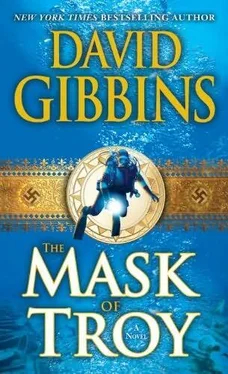David Gibbins - The Mask of Troy
Здесь есть возможность читать онлайн «David Gibbins - The Mask of Troy» весь текст электронной книги совершенно бесплатно (целиком полную версию без сокращений). В некоторых случаях можно слушать аудио, скачать через торрент в формате fb2 и присутствует краткое содержание. Жанр: Триллер, на английском языке. Описание произведения, (предисловие) а так же отзывы посетителей доступны на портале библиотеки ЛибКат.
- Название:The Mask of Troy
- Автор:
- Жанр:
- Год:неизвестен
- ISBN:нет данных
- Рейтинг книги:3 / 5. Голосов: 1
-
Избранное:Добавить в избранное
- Отзывы:
-
Ваша оценка:
- 60
- 1
- 2
- 3
- 4
- 5
The Mask of Troy: краткое содержание, описание и аннотация
Предлагаем к чтению аннотацию, описание, краткое содержание или предисловие (зависит от того, что написал сам автор книги «The Mask of Troy»). Если вы не нашли необходимую информацию о книге — напишите в комментариях, мы постараемся отыскать её.
The Mask of Troy — читать онлайн бесплатно полную книгу (весь текст) целиком
Ниже представлен текст книги, разбитый по страницам. Система сохранения места последней прочитанной страницы, позволяет с удобством читать онлайн бесплатно книгу «The Mask of Troy», без необходимости каждый раз заново искать на чём Вы остановились. Поставьте закладку, и сможете в любой момент перейти на страницу, на которой закончили чтение.
Интервал:
Закладка:
‘Huh?’
‘You didn’t hear?’
‘Up to my neck in the innards of an Aquapod all morning, I’m afraid.’
‘Another statue. Opposite the one Jeremy and Rebecca found.’
‘ Two statues.’
‘Almost like gate guardians,’ Jack said. ‘And he’s been in another tunnel. Just can’t keep him out of them. This time it’s the one the Austrians working at Troy a few years ago found leading from the citadel out to a spring beyond the walls. He got almost a hundred yards into it. Says he thinks it may lead to the chamber he believes is at the end of the passageway with the statues. He had one of our halogen dive torches with him and said he could see a long way ahead, well under the citadel. He got stuck.’
‘Well, that makes a change.’
‘Said it needs a more lithe, athletic form.’
‘Sounds right up my street.’
‘Thought we might nip over there after the dive for a little recce.’
‘You’re on.’
Jack heard a crackle in his headphone, and turned it down. ‘That was Macalister,’ Costas said. ‘Ten minutes to go.’
‘Roger that.’
‘While we wait. Run me through the Shield of Achilles again. What we’re looking for. The decoration.’
‘Best guess? Wooden-backed, about a metre across, covered in beaten gold. The decoration? Maybe bands of black niello, red carnelian, though whether that survives underwater for three thousand years, who knows. The scenes might show a kind of cosmography, a bit like a medieval mappa mundi. It’s for a hero, for display and swagger and appearance, but like most prestige weapons it’s made as if for real combat, using the best techniques of the smith. So the five layers described by Homer were probably built up one on top of the other, leaving a progressively smaller outer ring visible for the decorative scenes, and the thickest part of the shield in the centre, at the boss. That’s exactly how you’d make a real working shield, strengthening the centre where you fend off the blows, minimizing the weight around the edge. I think Homer had seen a shield like that being made, as he knew what he was talking about. The scenes he describes are plausible, everyday scenes of the world of heroes, the world before the apocalypse, scenes of hunting, contests between champions, the countryside, town life, the unending cycle of life in the Age of Heroes.’
‘And what if the world had moved beyond?’ Costas said. ‘Remember Auden? The thin-lipped armourer, Hephaestos, hobbles away, and Thetis “cried out in dismay at what the god had wrought”. We know the armour won’t protect her son Achilles from death, and maybe Homer’s audience knew that the shield as a metaphor wouldn’t protect history from the rise of Agamemnon, from the destruction of Troy, from total war.’
‘That’s good. Very good. Actually, thinking of Hugh has made me ponder all that too. What he must have seen, at the end of the Second World War. What Auden saw, in the bombed cities of Germany. A kind of truth that no artistry can mask, where no metaphor or simile or symbol can stand in for stark reality. Auden even talks about it, doesn’t he? “Of barbed wire, of weed-choked fields, of rape, of casual murder.” ’
‘The age of heroes, the age of controlled violence, is gone. The age of men has come.’
‘The history of our times. Maybe it all begins at Troy.’
The churning of the screws ended, and was replaced by the whirring noise of the ship’s water-jet stabilizers coming on line. A green light flashed above the entrance to the dock. ‘Okay. We’re on,’ Costas said. He gave a thumbs-up to the controller standing on the deck beside him. She raised one arm and pressed her headset against her ear to listen to instructions from the bridge, and then stood back and gave an emphatic thumbs-down. Costas repeated the sign to her and turned to Jack. ‘Good to go?’
Jack took a deep breath. They always treated submersible dives like SCUBA dives, using the same instructions and hand signals, a deliberate reminder that it was people, not machines, that were diving, and that the safety of a submersible dive was dependent on human judgement more than machines and computers. But Costas also knew Jack’s discomfort with submersibles and understood that treating the dive this way gave him a sense of control. Jack exhaled, then closed his eyes for a moment. It felt right. He looked intently at Costas, then put up his left hand and dropped the thumb down. ‘Roger that. Good to go.’
The davits quickly lowered and released them into the water. They were immediately under the waves, plummeting at a rate pre-set by the computer that controlled the buoyancy chambers in the pontoons. Had they lingered for even a moment and been a few metres off, they would have missed the wreck, with nothing to do other than abort the dive and try again. Thirty-five metres down, they entered the current stream with a jerk that pressed Jack back in his seat, but once in the stream he had little sense of it, like being on a high-speed escalator walkway. Dropping out of it, though, was a fairly serious G-force jolt that threw him forward. Below that the readout showed a modest 1.5 knot current, reduced enough for the Aquapods to maintain position at the site using their water-jet propulsion systems. Nevertheless, they had agreed with Macalister that this was not a day to linger, and they would leave in no more than twenty minutes. Officially the dive was a second recce to confirm what they had seen on the first dive and allow an excavation plan to be formulated for the next day.
Five minutes after exiting Seaquest II they had reached the site, perfectly on target. Jack breathed a silent thanks to Lanowski. He scanned the sea bed, remembering the waymarkers of their dive yesterday, distorted slightly through the Plexiglas dome. He activated the magnifier, which brought the image through the thick flat slab of glass at the front of the dome close to his face, as if he were looking through a mask. He immediately felt more comfortable, a diver again. They had come up off the starboard stern side of the wreckage. He saw the stem post of the ancient wreck, still there, the shape of the lion of Mycenae. He had not dreamed it. It was real. In the decaying superstructure of the minelayer he saw the gap where the Turkish navy divers had attached lifting bags and removed the mine. He jetted forward a few metres and angled the Aquapod to peer below the starboard side of the minelayer’s hull, where he had first seen the ancient timbers, some eight metres from the stem post. He was concerned to see how much more exposed the timbers were after only a matter of hours, with the increase in the current and the effect of his own rapid clearance by hand the day before. He could see several square metres of planking and frames on both sides, giving an exact image of the dimensions of the ancient hull as it converged towards the stem post. His pulse quickened. He had been right. It was a war galley, there was no doubt about it.
And there was more. As he sank closer, he saw other objects, close to where he had raised the pottery cup the day before. They were sticking out of the sand in bundles, having been buried in a grey anaerobic layer that was now exposed and being eroded away. Each bundle comprised several dozen wooden rods, with a concreted mass at the end. Jack knew exactly what they were. It was astonishing. He tapped the intercom. ‘Now I know exactly what Agamemnon’s treasure was.’
Costas’ Aquapod was directly in front of him, on the other side of the ancient hull, and had its camera arm extended, angled down at the objects. ‘A bundle of wooden rods coming out of a ferrous concretion. Talk to me, Jack.’
‘A bundle of arrows,’ Jack said excitedly. ‘And that corroded mass? Look closely. It’s not one mass. It’s lots of corroded lumps, joined together. That’s iron, Costas. Iron arrowheads. That’s what Agamemnon’s treasure was. That’s what gave him the edge. It’s exactly what James suspected. The Greeks had discovered iron technology. Look, beside it, there’s another bundle. And another. That’s how Agamemnon won the Trojan War, not by contests of heroes, but with iron, iron for all soldiers, for all weapons, for total war.’
Читать дальшеИнтервал:
Закладка:
Похожие книги на «The Mask of Troy»
Представляем Вашему вниманию похожие книги на «The Mask of Troy» списком для выбора. Мы отобрали схожую по названию и смыслу литературу в надежде предоставить читателям больше вариантов отыскать новые, интересные, ещё непрочитанные произведения.
Обсуждение, отзывы о книге «The Mask of Troy» и просто собственные мнения читателей. Оставьте ваши комментарии, напишите, что Вы думаете о произведении, его смысле или главных героях. Укажите что конкретно понравилось, а что нет, и почему Вы так считаете.












